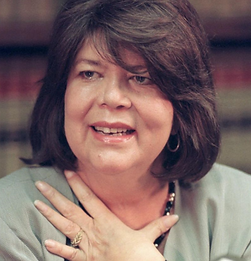National Day of Transformation
Film: Cherokee Word For Water
The Cherokee Word For Water is a 2013 film that celebrates the leadership of the late Wilma Mankiller, Principal Chief of the Cherokee Nation from 1985-1995. A feature-length motion picture, that is coming to life as a major motion picture, it is about a Cherokee community that uses traditional Native values of reciprocity and interdependence to rebuild their lives.
Set in the early 1980s, the screenplay was inspired by the Bell Waterline Project which was the subject of national media coverage. The leadership team includes Charlie Soap, Wilma Mankiller's husband. This positive, uplifting film focuses on the cultural assets of Native people and seeks to help reshape public perception about them. The film was cast almost entirely of Indians -- many Cherokee. Chief Oren Lyons, Onondaga, played the role of Soap’s grandfather.
See the trailer on the official site.
Also see the background video below which shows that Chief Mankiller's leadership in bringing water to the Cherokee has sparked a movement of similar projects -- as she had hoped.
Mankiller's autobiography Mankiller: A Chief and Her People is available on Amazon.com and on her site.
The article Wilma Mankiller celebrated during film’s Okla. premiere discusses Mankiller's legacy.


In the early 1980s, a young Mankiller pulled up to her mother’s home with her two teenage daughters. She had returned to her birthplace after growing up in San Francisco, California. Mankiller had also come back to help her people and said so to Ross Swimmer, the tribe’s principal chief from 1975-85.
The film recounts efforts Mankiller made to gain the trust of residents in the small community of Bell who were unable to qualify for housing assistance because the area did not have water service. The lack of suitable housing, in turn, prevented them from qualifying for grant money to bring water into the hills. Tasked by the chief with finding a solution, Mankiller goes to the residents of Bell and anyone in the tribe who will help bring water to even the most isolated pockets of the Cherokee Nation.
Soap helps a spirited Mankiller speak with families and elders about building a water line that could save the small community’s school building and bring water to the community. Residents are soon convinced that the project will only be complete if they volunteer their own time to install it.
The Cherokee people of Bell, with help from Mankiller and Soap, brought water to their homes for themselves as well as their non-Native neighbors. The Bell Project was the first of several water projects. Mankiller soon was elected as the tribe’s deputy chief. When Swimmer was appointed to assistant secretary of the U.S. Bureau of Indian Affairs, she became the Cherokee’s first woman Principal Chief, leading the tribe from 1985-1995. Mankiller died in 2010 of pancreatic cancer.
Kiehl, who met Mankiller during her first election campaign for principal chief, is also a producer on the film. They became close friends. “This is a story of hope and resilience,” Kiehl said. “She felt it would resonate beyond Indian Country to people everywhere. She said it was her hope that people who were living in depressed communities would see this film and would say, ‘If they can do it, we can do it.’”
The Cherokee word for water is Ꭰ Ꮉ (a-ma).





